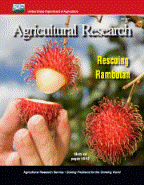United States Department of Agriculture: Agricultural Research Service, Lincoln, Nebraska

Agricultural Research Magazine
Date of this Version
4-2012
Document Type
Article
Citation
Agricultural Research Magazine 60(4): April 2012 pp. 13; ISSN 0002-161X
Abstract
An ARS scientist in Ithaca, New York, is using a new statistical approach to help speed the development of improved varieties of crops.
Plant breeders constantly strive to breed new varieties that yield more, resist emerging pests and pathogens, tolerate heat and drought, and grow in marginal soils and environments. Increasingly, molecular tools are used to speed those efforts. By identifying genes associated with desirable traits, scientists don’t have to wait for timeconsuming field observations.
“To grow wheat and evaluate it for traits in the field takes 5 to 9 years. Using genomic data, we can do it in about 6 months,” says Jean-Luc Jannink, who is in the ARS Plant, Soil, and Nutrition Research Unit at the Robert W. Holley Center for Agriculture and Health on the Cornell University campus, in Ithaca.
Though molecular tools speed up the process, they also require analyzing massive amounts of data. Jannink has demonstrated how new statistical approaches should help plant breeders handle all that data. Analysis of the data enables “genomic selection” (GS) of untested breeding lines, using predictions about which will perform best. Dairy cattle breeders have begun to use GS, and with Jannink’s help, it will catch on among plant breeders.
Included in
Agriculture Commons, Animal Sciences Commons, Food Science Commons, Plant Sciences Commons

